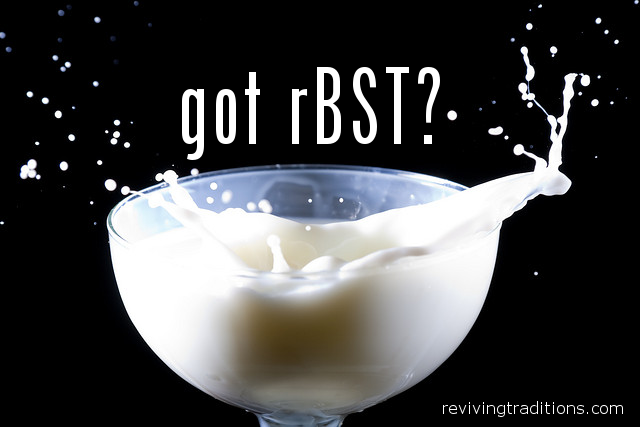*** The Governor’s Office has intervened in this issue and is initiating a review of the decision. The implementation has been delayed at least a month past the original January 1, 2008 date. Call the Governor’s office at (717) 787-2500 or EMAIL and voice you opinion.
In a giant step backwards for consumers, the Commonwealth of Pennsylvania has ordered dairy producers to stop labeling their dairy products as rBST-free. The hormone is banned in the European Union, Canada, Australia and Japan.
State Agriculture Secretary Dennis C. Wolff said advertising one brand of milk as free from artificial hormones implies that competitors’ milk is not safe. No, Mr. Wolff. It gives consumers a choice of whether to ingest dairy products produced with artificial hormones or not. If a consumer does not want to feed their children products produced with artificial hormones, that should be their choice.
It should not be the policy of the Commonwealth of Pennsylvania to ban free labeling of dairy products. The labeling of dairy products as being rBST-free does not state health benefits, it does not make medical or health claims. It allows consumers to make their own decisions about what they want to feed themselves and their families. It is a funamental right of consumers to be able to spend their money as they see fit. It is NOT the right of Monsanto – or any other corporation – to write the laws that govern our food safety.
Michael R. Taylor, the FDA’s deputy commissioner for policy, wrote the FDA’s rBGH labelling guidelines. The guidelines, announced in February 1994, virtually prohibited dairy corporations from making any distinction between products produced with and without rBGH. The FDA announced that labels on non-rBGH products must state that there is no difference between rBGH and the naturally occurring hormone. Micheal R. Taylor was a lawyer for the Monsanto corporation for seven years. HELLO?!?
rBST/rBGH (they are the same thing) is used to speed up the metabolism of cows. Farmers who do not use Monsanto’s drug are at a disadvantage, because their cows produce less milk. The only advantage they have is consumer awareness and the desire for natural and environmentally friendly products.
And now. the Commonwealth of Pennsylvania has taken Monsanto’s stance that consumers should not have any knowledge at all about how their food is produced.
This is nothing more than another instance of our government regulators kowtowing to big business at the expense of consumer information. Monsanto is finding that less dairies want to use its drug, so they are now using every means they can to keep consumers from knowing when it is being used.
The Fair Packaging and Labeling Act states:
Informed consumers are essential to the fair and efficient functioning of a free market economy. Evidently, this doesn’t apply to someone wanting to know how their milk was produced. An “informed consumer” is bad for business.
An “informed consumer” also doesn’t need to know where his or her food comes from, either:
- On May 13, 2002, President Bush signed into law the 2002 Farm Bill. One of its many initiatives required country of origin labeling for beef, lamb, pork, fish, perishable agricultural commodities and peanuts.
- On January 27, 2004, President Bush signed Public Law 108-199 which delayed the implementation of mandatory COOL for all covered commodities except wild and farm-raised fish and shellfish until September 30, 2006.
- On November 10, 2005, President Bush signed Public Law 109-97, which delayed the implementation for all covered commodities except wild and farm-raised and shellfish until September 30, 2008.
Anyone want to place bets that the country of origin labels won’t be in place on September 30, 2008?

